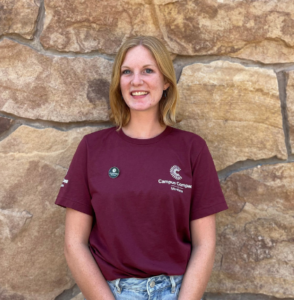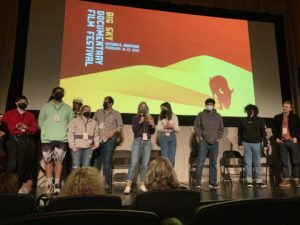Life is Precious Here by Katey Funderburgh

Prison abolitionist Ruth Wilson Gilmore believes that “where life is precious, life is precious.” When we treat each life with the full sanctity it deserves, when we provide people with everything they need to live healthy, happy lives, we engage in mutual care for our communities. We reduce the chance of harm and violence. We break down barriers and allow people to thrive. Providing high-quality education, clean water, good food, reliable healthcare, safe housing resources, access to natural spaces– everything a human needs to thrive– all makes life itself more precious. As an AmeriCorps member, I realize that all of my service is an effort to contribute to this belief. I want to build a world that makes life more precious. And with Montana Campus Compact, that is what I strive to do.
I serve primarily as an Upward Bound Instructor through Salish Kootenai College. In this role, I provide mentorship to high school students in the program. When I meet with them, I focus on building relationships and adapting each session to the needs of the individual. Whereas some students need me to edit their scholarship essays, some want help with their math homework, and some need to talk through the problems they’re facing. I love the dynamic nature of this role, but I know that Upward Bound would not exist if the need for it were not so great in this community; these students are doing everything they can to break cycles of poverty and generational trauma. Though my sessions with them are joyful and empowering, I see the severity of American injustices come to intersect most heavily on these youth, many of whom are Native American, queer, and low-income. It’s radically unfair, and severely angering, that so much is against these young people.

But it is not my responsibility to tell that side of their stories. To recount the trauma in the lives of my students instead of their many joys and strengths would be to do them a great disservice, for above all else, they are resilient, intelligent, and compassionate young people, capable of inheriting this world and making something beautiful out of their struggles. Though I am their mentor, I learn more from them than I could ever have predicted. Perhaps my students are the ones who best embody Ruth Wilson Gilmore’s belief that life is precious when we make it so, for their sense of justice lies just at the surface of their emotions. I am charged with cultivating that intuition, with helping them inherit a world that is hopefully softer, safer, more survivable. With all going on internationally right now, this task feels ever more important. How do I mentor high school students in a post-pandemic, late-stage capitalism, pending war-torn America ripe with social change? I don’t know, but I’m guided by the needs of my students, and I believe so fully in the sense of radical hope I am discovering through AmeriCorps. Not all is lost; we will build a better future, step by step.
One of my other responsibilities as an AmeriCorps Leader is to be a math mentor at one of the high schools here. Each day, I provide support to students by pulling small groups, working one-on-one with anyone who needs extra help, and monitoring classroom behavior to create a learning environment that is both productive and holistic; the wellbeing of the students always comes first. Though I want them to learn as much as possible, I also understand that giving them chances to express themselves is key to lowering the risk of inter-classroom violence, office referrals, or failing the class altogether. I have to set down my pride and expectations if I want to really listen to a frustrated student, but every time I do, I hear Ruth Wilson Gilmore in my head again: “Where life is precious, life is precious.” I remember that my role as an AmeriCorps Leader in this high school is to be intentional about the care I give to these young people. Does the lesson need to be adjusted? Do I need to slow down and reteach a concept? Or, do I just need to make space for the student to talk about what might be going on outside of school? What do I need to do to help them learn while always protecting their precious lives? If I am to use my year as an AmeriCorps member to help repair what is broken in these systems we live within, I have to build that sense of radical care into every interaction I have with my students.

When I am not in schools as a math mentor or Upward Bound Instructor, I contribute to the food security efforts going on at Salish Kootenai College. The Food Access Committee has been working to address pervasive hunger in the community for years now, and recently, they’ve begun building the infrastructure for a food pantry and fresh food boxes to give out to families in need. Being a part of this initiative reminds me that making life precious is about all of us working together to nourish– literally, metaphorically– our neighbors. Reservations like the Flathead Reservation I serve on commonly experience food deserts and high rates of hunger and poverty; Native communities have been engaging in community organizing initiatives to feed each other for as long as the need has been present. For this community, finding paths to fill the gaps left by long histories of American genocide and systemic injustice is instinctual. It takes all of us, and it takes time. I am so angered that members of this community have gone hungry for much too long because of the many violences inflicted on Native peoples by the American government. But when I pass out grocery bags full of food, or participate in organizational meetings with other members of the Food Access Committee, I experience that wave of hope again. The solution is mutual aid like this. We take care of each other, because life is precious here.
Service is difficult. Daily, I confront the pain of this American reality and I have to choose hope. But I do not choose it alone. My community teaches me. My students hold love and struggle in both hands, and the Food Access Committee turns care into action. I am so honored to step into my classroom, to talk with each student, to be a part of these hunger initiatives. I believe in the world I am building. I believe that each life is precious, and I will be here every day working to make it so. Alongside everyone else who believes with me.
 Blog
Blog